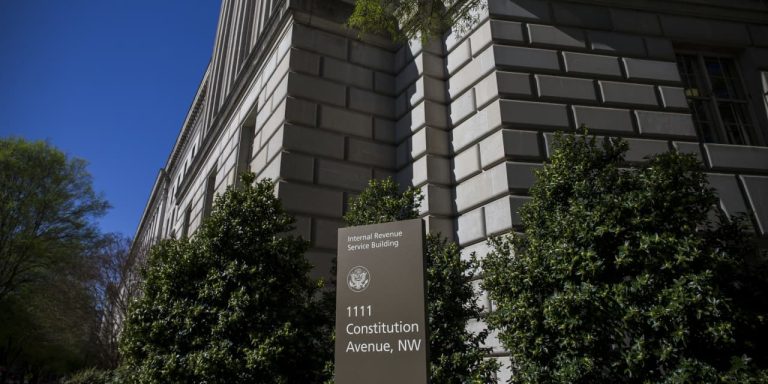The Internal Revenue Service has been warning that it would step up tax audits. It’s finally happening, beginning with partnerships and certain wealthy individuals.
The agency has rolled out its first phase in a new era of enforcement with a bigger budget. It is targeting partnerships with more than $10 million in income and individuals with more than $1 million in income and at least $250,000 of tax debt.
Starting last month, the IRS began scouring the tax returns of partnerships with more than $10 billion in income, looking for discrepancies in their balance sheets, such as a reported liability that doesn’t match information that the IRS collects from a creditor, or asset valuations that appear inflated or deflated.
Some 500 partnerships have already been singled out by the IRS and should expect letters from the agency seeking explanations for suspicious aspects of their returns, says Mark Friedlich, vice president of government affairs at
Wolters Kluwer
and a member of an IRS enforcement advisory team.
“If a partnership’s responses to the questions in these letters aren’t adequate to satisfy the IRS, it will be audited,” Friedlich says. Other red flags are if a proportion of income or losses claimed by a partner doesn’t align with his or her percentage interest in the entity, if there has been a sale of partnership interest, or if a partnership’s tax return shows that a partner claimed an exception to paying the self-employment tax. “These partnerships are typically global in scope and can be in any industry but are often hedge funds, private-equity funds, law firms, global accounting firms or investment partnerships,” he says.
The IRS also plans full audits of the nation’s 75 largest partnerships. “If you’re among the 75 biggest, you’re getting audited, red flags or no red flags,” Friedlich says.
The IRS will be aided by new artificial intelligence technology programmed to look for patterns in tax returns that suggest noncompliance. In addition, some 3,700 enforcement employees are being added to the IRS’s payroll under a new unit established for audits of complex tax returns.
“Evidence suggests that when you look at the tax gap, a good portion of that may be coming from certain pass-through entities that are organized as partnerships and aren’t that transparent. There’s a higher chance with these that there’s a difference between what is owed and what is paid,” says Garrett Watson, senior policy analyst at the Tax Foundation.
The tax gap refers to the roughly $700 million the IRS believes it is owed, but that goes uncollected each year.
After the IRS’s general audit rate plummeted to around 0.25% in 2020 from 0.90% in 2010, the agency’s enforcement engines are revving again thanks to approximately $60 billion available to improve enforcement and service over 10 years under the Inflation Reduction Act, which was passed late last year.
The audit rate of partnerships has historically been lower than average, and in recent years dipped to around 0.05%, largely because the IRS has been lacking enforcement staff sophisticated enough to understand these complex entities.
Partnerships are the most flexible pass-through entities. There is no limit to the allowable number of partners in a single partnership, and partners—or owners—can be different entities, such as foreign or domestic individuals, trusts, S corporations, C corporations or other partnerships.
The number of these sophisticated structures has exploded in recent years as the IRS’s enforcement capabilities were steadily weakened by funding cuts.
Between 2010 and 2020, the number of partnerships with more than $10 million in assets swelled 92% to 255,294, and their assets ballooned to $40.2 trillion from $17.5 trillion and now account for 93% of all assets in partnerships, according to IRS data.
The more assets a partnership has, the more owners it is likely to have. There were 9.1 million partners associated with the 72,978 partnerships that had more than $50 million in assets in 2020, according to IRS data.
Partnerships’ complexities are sometimes a result of an effort to limit liability from spreading to an entire business, says Ryan Hess, assistant professor of accounting at Oklahoma State University, and part of an IRS advisory group on partnership enforcement.
Consider a construction company structured as a partnership. It may make sense to create a different partnership for every construction project, each owned by one or more partners in the original business partnership. “If something goes wrong with building a mall, collectors can’t come after your assets in your residential unit,” Hess says.
Rob Wall, a tax attorney and partner at Akerman in Winston-Salem, N.C., says partnership tax law, which dates back to 1986, is the most complicated part of the tax code. “It’s like a chess match with the government on some of these laws. The government may say you can’t do this, but well, you can’t under certain provisions but under another provision with a different process and procedure, you can.”
To improve efficiency and returns on enforcement efforts, the IRS has been ramping up new AI technology.
“We have shown in our research that using sophisticated AI systems can give a substantial boost in identifying which partnerships may be noncompliant,” says Emily Black, assistant professor of computer science at Barnard College at Columbia University. “This should vastly increase IRS capabilities without a huge increase in cost.”
For owners of partnerships and wealthy individuals, there is a silver lining to the agency’s use of AI, says Janet Holtzblatt, a senior fellow at the Urban-Brookings Tax Policy Center.
“What’s promising about these new technologies is that they will improve the IRS’s ability to identify the right partnerships and the right wealthy individuals to target,” Holtzblatt says. “An improved selection criteria would reduce the burden on people who are following the laws.”
Write to [email protected]
Read the full article here









